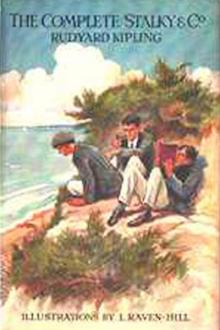Stalky & Co. - Rudyard Kipling (ebooks children's books free TXT) 📗

- Author: Rudyard Kipling
- Performer: -
Book online «Stalky & Co. - Rudyard Kipling (ebooks children's books free TXT) 📗». Author Rudyard Kipling
“It is not often that I do not understand you; but I confess I do not to-night. Some of you, after your idiotic performances at prep., seem to think me a fit person to cheer. I am going to show you that I am not.”
Crash—crash—crash—came the triple cheer that disproved it, and the Head glowered under the gas. “That is enough. You will gain nothing. The little boys (the Lower School did not like that form of address) will do me three hundred lines apiece in the holidays. I shall take no further notice of them. The Upper School will do me one thousand lines apiece in the holidays, to be shown up the evening of the day they come back. And further—”
“Gummy, what a glutton!” Stalky whispered.
“For your behavior towards Mr. Mason I intend to lick the whole of the Upper School to-morrow when I give you your journey-money. This will include the three study-boys I found dancing on the form-room desks when I came up. Prefects will stay after callover.”
The school filed out in silence, but gathered in groups by the gymnasium door waiting what might befall.
“And now, Flint,” said the Head, “will you be good enough to give me some explanation of your conduct?”
“Well, sir,” said Flint desperately, “if you save a chap’s life at the risk of your own when he’s dyin’ of diphtheria, and the Coll. finds it out, wha-what can you expect, sir?”
“Um, I see. Then that noise was not meant for—ah, cheek. I can connive at immorality, but I cannot stand impudence. However, it does not excuse their insolence to Mr. Mason. I’ll forego the lines this once, remember; but the lickings hold good.”
When this news was made public, the school, lost in wonder and admiration, gasped at the Head as he went to his house. Here was a man to be reverenced. On the rare occasions when he caned he did it very scientifically, and the execution of a hundred boys would be epic—immense.
“It’s all right, Head Sahib. We know,” said Crandall, as the Head slipped off his gown with a grunt in his smoking-room. “I found out just now from our substitute. He was gettin’ my opinion of your performance last night in the dormitory. I didn’t know then that it was you he was talkin’ about. Crafty young animal. Freckled chap with eyes–Corkran, I think his name is.”
“Oh, I know him, thank you,” said the Head, and reflectively. “Ye-es, I should have included them even if I hadn’t seen ‘em.”
“If the old Coll. weren’t a little above themselves already, we’d chair you down the corridor,” said the Engineer. “Oh, Bates, how could you? You might have caught it yourself, and where would we have been, then?”
“I always knew you were worth twenty of us any day. Now I’m sure of it,” said the Squadron Commander, looking round for contradictions.
“He isn’t fit to manage a school, though. Promise you’ll never do it again, Bates Sahib. We—we can’t go away comfy in our minds if you take these risks,” said the Gunner.
“Bates Sahib, you aren’t ever goin’ to cane the whole Upper School, are you?” said Crandall.
“I can connive at immorality, as I said, but I can’t stand impudence. Mason’s lot is quite hard enough even when I back him. Besides, the men at the golf-club heard them singing ‘Aaron and Moses.’ I shall have complaints about that from the parents of dayboys. Decency must be preserved.”
“We’re coming to help,” said all the guests.
The Upper School were caned one after the other, their overcoats over their arms, the brakes waiting in the road below to take them to the station, their journey-money on the table. The Head began with Stalky, McTurk, and Beetle. He dealt faithfully by them.
“And here’s your journey-money. Good-by, and pleasant holidays.”
“Good-by. Thank you, sir. Good-by.”
They shook hands. “Desire don’t outrun performance—much—this mornin’. We got the cream of it,” said Stalky. “Now wait till a few chaps come out, and we’ll really cheer him.”
“Don’t wait on our account, please,” said Crandall, speaking for the Old Boys. “We’re going to begin now.”
It was very well so long as the cheering was confined to the corridor, but when it spread to the gymnasium, when the boys awaiting their turn cheered, the Head gave it up in despair, and the remnant flung themselves upon him to shake hands. Then they seriously devoted themselves to cheering till the brakes were hustled off the premises in dumb-show.
“Didn’t I say I’d get even with him?” said Stalky on the box-seat, as they swung into the narrow Northam street. “Now all together—takin’ time from your Uncle Stalky: “It’s a way we have in the Army, It’s a way we have in the Navy, It’s a way we have at the Public Schools, Which nobody can deny!”
THE FLAG OF THEIR COUNTRY.
It was winter and bitter cold of mornings. Consequently Stalky and Beetle—McTurk being of the offensive type that makes ornate toilet under all circumstances-drowsed till the last moment before turning out to callover in the gas-lit gymnasium. It followed that they were often late; and since every unpunctuality earned them a black mark, and since three black marks a week meant defaulters’ drill, equally it followed that they spent hours under the Sergeant’s hand. Foxy drilled the defaulters with all the pomp of his old parade-ground. “Don’t think it’s any pleasure to me” (his introduction never varied). “I’d much sooner be smoking a quiet pipe in my own quarters—but I see we ‘ave the Old Brigade on our ‘ands this afternoon. If I only ‘ad you regular, Muster Corkran,” said he, dressing the line.
“You’ve had me for nearly six weeks, you old glutton. Number off from the right!”
“Not quite so previous, please. I’m taking this drill. Left, half—turn! Slow—march.” Twenty-five sluggards, all old offenders, filed into the gymnasium. “Quietly provide yourselves with the requisite dumb-bells; returnin’ quietly to your place. Number off from the right, in a low voice. Odd numbers one pace to the front. Even numbers stand fast. Now, leanin’ forward from the ‘ips, takin’ your time from me.”
The dumb-bells rose and fell, clashed and were returned as one. The boys were experts at the weary game.
“Ve-ry good. I shall be sorry when any of you resume your ‘abits of punctuality. Quietly return dumb-bells. We will now try some simple drill.”
“Ugh! I know that simple drill.”
“It would he ‘ighly to your discredit if you did not, Muster Corkran. At the same time, it is not so easy as it looks.”
“Bet you a bob, I can drill as well as you, Foxy.”
“We’ll see later. Now try to imagine you ain’t defaulters at all, but an ‘arf company on parade, me bein’ your commandin’ officer. There’s no call to laugh. If you’re lucky, most of you will ‘ave to take drills ‘arf your life. Do me a little credit. You’ve been at it long enough, goodness knows.”
They were formed into fours, marched, wheeled, and countermarched, the spell of ordered motion strong on them. As Foxy said, they had been at it a long time.
The gymnasium door opened, revealing McTurk in charge of an old gentleman.
The Sergeant, leading a wheel, did not see. “Not so bad,” he murmured. “Not ‘arf so bad. The pivot-man of the wheel honly marks time, Muster Swayne. Now, Muster Corkran, you say you know the drill? Oblige me by takin’ over the command and, reversin’ my words step by step, relegate them to their previous formation.”
“What’s this? What’s this?” cried the visitor authoritatively.
“A—a little drill, sir,” stammered Foxy, saying nothing of first causes.
“Excellent—excellent. I only wish there were more of it,” he chirruped. “Don’t let me interrupt. You were just going to hand over to someone, weren’t you?”
He sat down, breathing frostily in the chill air. “I shall muck it. I know I shall,” whispered Stalky uneasily; and his discomfort was not lightened by a murmur from the rear rank that the old gentleman was General Collinson, a member of the College Board of Council.
“Eh—what?” said Foxy.
“Collinson, K.C.B.—He commanded the Pompadours-my father’s old regiment,” hissed Swayne major.
“Take your time,” said the visitor. “I know how it feels. Your first drill—eh?”
“Yes, sir.” He drew an unhappy breath. “‘Tention. Dress!” The echo of his own voice restored his confidence.
The wheel was faced about, flung back, broken into fours, and restored to line without a falter. The official hour of punishment was long passed, but no one thought of that. They were backing up Stalky—Stalky in deadly fear lest his voice should crack.
“He does you credit, Sergeant,” was the visitor’s comment. “A good drill—and good material to drill. Now, it’s an extraordinary thing: I’ve been lunching with your head-master and he never told me you had a cadet-corps in the College.”
“We ‘aven’t, sir. This is only a little drill,” said the Sergeant.
“But aren’t they keen on it?” said McTurk, speaking for the first time, with a twinkle in his deep-set eyes.
“Why aren’t you in it, though, Willy?”
“Oh, I’m not punctual enough,” said McTurk. “The Sergeant only takes the pick of us.”
“Dismiss! Break off!” cried Foxy, fearing an explosion in the ranks. “I—I ought to have told you, sir, that—”
“But you should have a cadet-corps.” The General pursued his own line of thought. “You shall have a cadet-corps, too, if my recommendation in Council is any use. I don’t know when I’ve been so pleased. Boys animated by a spirit like yours should set an example to the whole school.”
“They do,” said McTurk.
“Bless my soul! Can it be so late? I’ve kept my fly waiting half an hoar. Well, I must run away. Nothing like seeing things for one’s self. Which end of the buildings does one get out at? Will you show me, Willy? Who was that boy who took the drill?”
“Corkran, I think his name is.”
“You ought to know him. That’s the kind of boy you should cultivate. Evidently an unusual sort. A wonderful sight. Five and twenty boys, who, I dare say, would much sooner be playing cricket—”(it was the depth of winter; but grown people, especially those who have lived long in foreign parts, make these little errors, and McTurk did not correct him)—“drilling for the sheer love of it. A shame to waste so much good stuff; but I think I can carry my point.”
“An’ who’s your friend with the white whiskers?” demanded Stalky, on McTurk’s return to the study.
“General Collinson. He comes over to shoot with my father sometimes. Rather a decent old bargee, too. He said I ought to cultivate your acquaintance, Stalky.”
“Did he tip you?” McTurk exhibited a blessed whole sovereign.
“Ah,” said Stalky, annexing it, for he was treasurer. “We’ll have a hefty brew. You’d pretty average cool cheek, Turkey, to jaw about our keenness an’ punctuality.”
“Didn’t the old boy know we were defaulters?” said Beetle.
“Not him. He came down to lunch with the Head. I found him pokin’ about the place on his own hook afterwards, an’ I thought I’d show him the giddy drill. When I found he was so pleased, I wasn’t goin’ to damp his giddy ardor. He mightn’t ha’ given me the quid if I had.”
“Wasn’t old Foxy pleased? Did you see him get pink behind the ears?” said Beetle. “It was an awful score for him. Didn’t we back him up beautifully? Let’s go down to Keyte’s and get some cocoa and sassingers.”
They overtook





Comments (0)